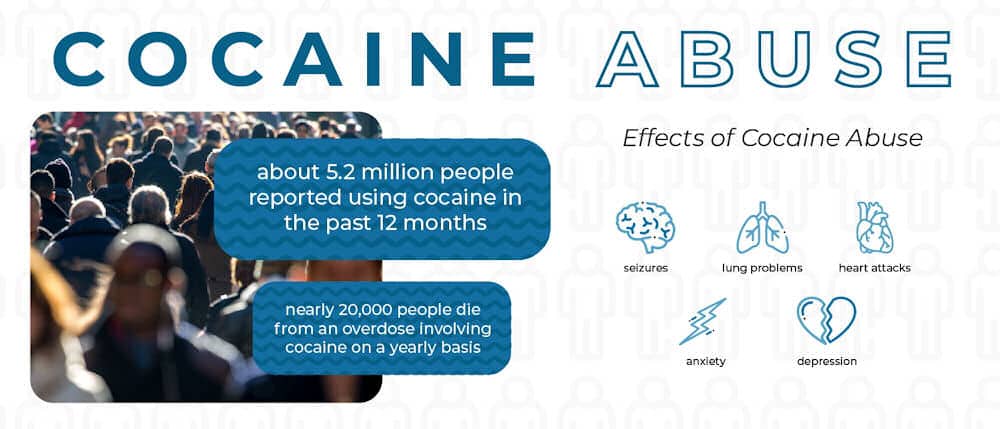 Nobody starts out trying to become a cocaine addict. But the feeling of alertness and energy and being on top of your game can seduce a person into the desire for the feeling all the time. After a time, that desire turns into a need and continues to escalate. Individuals who are struggling with cocaine addiction need comprehensive cocaine addiction treatment.
Nobody starts out trying to become a cocaine addict. But the feeling of alertness and energy and being on top of your game can seduce a person into the desire for the feeling all the time. After a time, that desire turns into a need and continues to escalate. Individuals who are struggling with cocaine addiction need comprehensive cocaine addiction treatment.
This includes:
- A medically supervised detox
- Multi-level treatment programs
- Psychotherapies
- Continuing care
What is Cocaine?
 Cocaine is an intense, euphoria-causing stimulant drug that has a strong potential for addiction. It raises your levels of attention, energy, and alertness. Cocaine is made from the leaves of the coca plant which is found in South America. This substance is illegal in the United States.
Cocaine is an intense, euphoria-causing stimulant drug that has a strong potential for addiction. It raises your levels of attention, energy, and alertness. Cocaine is made from the leaves of the coca plant which is found in South America. This substance is illegal in the United States.
Other names for cocaine include:
- Coke
- Snow
- Blow
- Crack
How is Cocaine Used?
Cocaine is usually distributed in two different consistencies. The most common is a fine, white powder. The other form is a solid rock crystal.
Most cocaine users snort the powder into their noses. Some dissolve it in water and inject it with a needle. Others will rub it into their gums.
Cocaine base, the rock crystal form called crack, is heated up and the smoke is inhaled into the lungs. Injecting cocaine, snorting cocaine, or smoking cocaine are the most common ways of using cocaine. Regardless, though, all mucous membranes can easily absorb cocaine.
Legal Status
Under the Controlled Substances Act, cocaine is a Schedule II drug. This means that it has a high potential for abuse and has an accepted medical use in the U.S. Cocaine hydrochloride solution is used mainly as a topical local anesthetic for the upper respiratory tract. Cocaine can also be used to reduce bleeding in the mucous membranes in the nasal cavities, mouth, and throat. These days, though, more effective products have been developed so cocaine is rarely used.
Because of cocaine’s high potential for abuse, many people that use cocaine quickly become addicted to it and need to attend addiction treatment.

The Effects of Cocaine on the Brain
 The intensity of cocaine’s effects depends on how fast the drug gets to the brain. This depends on the dose and the method of abuse. After smoking cocaine or injecting cocaine into the veins, it reaches the brain in seconds with a rapid buildup. This is what produces the intense euphoric effect known as a “rush.” In contrast, the rush caused by snorting cocaine is less intense and doesn’t happen as quickly because of the slower buildup in the brain.
The intensity of cocaine’s effects depends on how fast the drug gets to the brain. This depends on the dose and the method of abuse. After smoking cocaine or injecting cocaine into the veins, it reaches the brain in seconds with a rapid buildup. This is what produces the intense euphoric effect known as a “rush.” In contrast, the rush caused by snorting cocaine is less intense and doesn’t happen as quickly because of the slower buildup in the brain.
When cocaine is used, it sends high levels of dopamine into parts of your brain that control pleasure. Dopamine is a natural chemical messenger in your body.
The buildup from cocaine use causes intense feelings of energy and alertness also called a “high.” These euphoric feelings may cause you to have strong cravings for the drug and the high it gives you.
However, the more you use cocaine, the more your brain will adapt to it. Soon, you need stronger or more frequent doses to feel the same high. This is called tolerance, and it develops quickly with cocaine use. This can bring about a dangerous addiction or overdose.
Stronger and more frequent use of cocaine can cause long-term changes to the chemistry of a person’s brain. As a result, the mind and body begin to become dependent on cocaine, making it harder to think, sleep, and recall things from memory. Your reaction time when using cocaine may even actually become slower.
Cocaine’s Effects on Your Body
The physiological effects of cocaine include:
- Increase in blood pressure and heart rate
- Dilated pupils
- Loss of appetite
- Insomnia
- Irregular heartbeat
- Cardiac arrest
- Stroke
- Death
For some users, long-term use of inhaled cocaine has caused a unique respiratory syndrome and erosion of the upper nasal cavity.
Short-Term Effects of Cocaine Use
Short-term effects of cocaine use include:
- Excessive sensitivity to sound, touch, and sight
- Extreme happiness
- Irritability/anger
- Paranoia
- Loss of appetite
Long-Term Effects of Cocaine Use
Individuals who use cocaine frequently might also have more serious side effects and health problems. Some long-term effects of cocaine use though, include:
- Headaches
- Seizures and convulsions
- Heart attack, heart disease, and stroke
- Mood problems
- Sexual issues
- Lung damage
- HIV or hepatitis if injecting cocaine
- Bowel decay if swallowed
- Loss of sense of smell, nosebleeds, runny nose, and problems swallowing if you snort cocaine
How to Quit Cocaine
If you’ve become dependent on or addicted to cocaine, you will experience some withdrawal symptoms when you quit using it. These withdrawals can become more severe if you were a heavy user.
Can You Quit Cocaine “Cold Turkey?”

You have probably heard the expression “cold turkey.” Quitting a substance cold turkey means that the person abruptly stops all use of the drug.
How to Quit Cocaine?
Although many people try to quit using cocaine on their own, it’s best to quit cocaine and other substances with the supervision and support of qualified treatment professionals. This is particularly true if one is also using other substances or has co-occurring conditions.
Why You Need a Supervised Detox
People who struggle with cocaine addiction may have problems when they try to quit on their own because:
- They don’t have structure in their approach
- They don’t have the appropriate support such as:
– a mutual self-help group
– a therapist
– medical supervision - They go back to old habits or engage with people they used to use cocaine with
- They aren’t ready to deal with the withdrawal symptoms and strong cravings that happen when first quitting cocaine use.
Performing a cocaine detox at home can be risky if your symptoms become severe. Cocaine withdrawal is generally safe, but a supervised detox may sometimes be necessary. Some side effects of withdrawal are severe depression, paranoia, psychosis, or suicidal thoughts.
How Long Does Cocaine Withdrawal Last?
Although the symptoms of cocaine withdrawal are intense, they aren’t permanent and won’t last forever. The initial “crash” of cocaine withdrawal can range in time and severity from hours to days.
Some users go through weeks or months of withdrawal symptoms. This is known as post-acute withdrawal syndrome (PAWS).
Cocaine Withdrawal Symptoms
The cocaine withdrawal experience is different for every person. However, there are some common cocaine abuse symptoms that are typical of the experience. Some of these symptoms of cocaine withdrawal are described below.
Cravings
Most people who are going through withdrawal from cocaine have a strong desire to use more of it. These feelings are known as cravings, and they are common among many people withdrawing from substances. Cravings are motivated by the need to reduce the symptoms of withdrawal as well as the wish to re-experience the pleasure of the cocaine high.
Mood Changes
Feeling anxious, depressed, or irritable is a normal part of withdrawal from cocaine. While these feelings are usually intense during cocaine withdrawal, they tend to pass after the withdrawal stage is over.
Fatigue
A normal part of cocaine withdrawal is the feeling of extreme tiredness. Along with the exhaustion that you naturally feel after the stimulant effects of cocaine, you might have worn yourself out from lack of sleep and energetic activity while you were high.
Cocaine masks the discomfort you would normally feel from being overactive. This adds to the feelings of tiredness when the cocaine wears off.
Difficulty Sleeping
One of the common frustrations that people experience during cocaine withdrawal is problems sleeping. Even though you’re extremely fatigued, cocaine withdrawal causes problems such as:
- Unpleasant and vivid dreams
- Insomnia (trouble getting to sleep or staying asleep)
- Hypersomnia (too much sleep)
Increased Appetite
A well-recognized sign of cocaine withdrawal is an increase in your appetite. This may be heightened by not eating properly while using cocaine. At this time, it’s important to support your recovery by eating a healthy diet in small amounts rather than binging.
Agitation or Slowing Down Physically
Going through cocaine withdrawal can often cause a kind of physical slowing down called psychomotor retardation. On the other hand, you might feel physically agitated.
Relief and Coping
Since there aren’t any FDA-approved medications to help reduce the effects of cocaine withdrawal, the most important thing you can do is get support from people who understand what you’re going through. This can include medical professionals and loved ones.
Healthy habits like eating nutritious food, getting regular exercise, and getting enough sleep can be a good way to jump-start feeling better after cocaine withdrawal. Focus on taking care of yourself physically and mentally as you go through the withdrawal process.
Drug Abuse Treatment Programs
The best way to treat cocaine addiction is through a quality treatment center that focuses on drug abuse. At this time, you’ll need the extra support of either residential or outpatient treatment. Drug addiction treatment professionals can provide evidence-based treatment options that can help you learn to defeat drug cravings and prevent future relapses. Mental health services can help overcome crack cocaine addiction and other drug abuse cases.
The most common forms of cocaine addiction treatment are counseling and other types of therapy. You might also need to stay in a rehabilitation center (rehab) or attend intensive outpatient treatment to overcome cocaine addiction. Your treatment sessions with a trained therapist can help you make changes to your thought processes and behaviors.
Long-Term Treatment
The first stage of cocaine withdrawal is often referred to as “the crash.” But people commonly experience symptoms like cravings, irritability, and low energy for several weeks. Because cocaine use caused lasting changes in the brain, addiction can be hard to treat and relapses do occur.
Therapies
Long-term treatment for cocaine addiction usually focuses on individual counseling that includes behavioral therapy. Common behavioral therapies used in cocaine addiction treatment include:
- Cognitive Behavioral Therapy (CBT)–CBT has proven to be an effective form of therapy for the treatment of addiction, especially when used with other treatments. It’s also effective for supporting long-term abstinence and relapse prevention.
- Dialectical Behavior Therapy (DBT)–DBT is a form of behavior therapy similar to CBT but focuses more on emotions and relationships. Through DBT, individuals learn acceptance and change.
- Contingency Management (CM) –Contingency management uses motivational incentives to encourage people to abstain from drug use. People can earn vouchers or points that can be used for items that help encourage healthy choices. This method of therapy is particularly effective during the early phases of cocaine addiction treatment to help encourage abstinence.
- Family Therapy – Addiction is a family disease. When one member has an addiction, everyone in the family is affected by it. Family therapy is a way to mend broken family relationships while also educating family members about addiction.
Start Your Recovery at Casco Bay Today
 Casco Bay Recovery is the premier treatment facility in Portland, Maine. Our behavioral therapies allow for personalized and effective treatment. We are a fully accredited facility with experienced addiction specialists and licensed therapists and the ability to provide you with the individualized, comprehensive treatment you deserve.
Casco Bay Recovery is the premier treatment facility in Portland, Maine. Our behavioral therapies allow for personalized and effective treatment. We are a fully accredited facility with experienced addiction specialists and licensed therapists and the ability to provide you with the individualized, comprehensive treatment you deserve.
You don’t need to struggle or go through addiction treatment alone. Whether you want to help yourself or someone you care about, we can provide an individualized treatment protocol to specifically address your needs.
Our treatment programs include:
- Partial Hospitalization Program (PHP) – A PHP is a program that is as intense as a residential rehab except you don’t live at the treatment facility. You attend intense therapy sessions for 5 full days per week.
- Intensive Outpatient Program (IOP) –The IOP is a less intensive program than the PHP, requiring fewer hours at the facility, typically only 3 days per week.
- Outpatient Program (OP) –This program has a lower time commitment than the previous programs and is a good way to continue your care after completing one of the more intensive programs.
Specialized Programs
In addition to our basic treatment programs, we can offer specialized treatment programs not found at all treatment centers. They include:
- Dual Diagnosis Treatment – When an individual has co-occurring mental health and substance use disorder, it is called a dual diagnosis. A dual diagnosis requires both conditions to be treated simultaneously, and many rehabs are not prepared to do that. Luckily, we here at Casco Bay Recovery
- Men’s and Women’s Rehab Programs – Because men and women struggle with addiction in different ways, many men find a male-only program to be more conducive to their recovery.
- Likewise, many women are uncomfortable speaking openly in a group with men. Sometimes it’s because their addiction may be a result of unhealthy relationships with men.
- Young Adult Rehab Program–Teens and young adults are more willing to open up with people their own age.
At Casco Bay, we are dedicated to recovery. Our drug abuse treatment programs have helped so many people overcome substance abuse and cocaine dependence. You can trust yourself, your child, or anyone you care about with our compassionate, caring professionals. Contact us today and find out what we can do for you.

